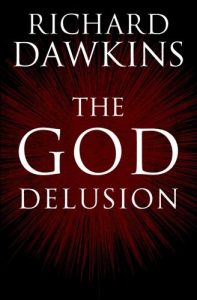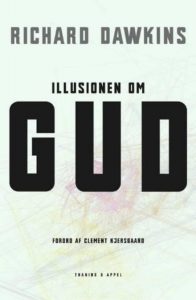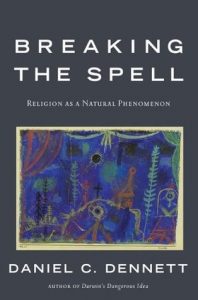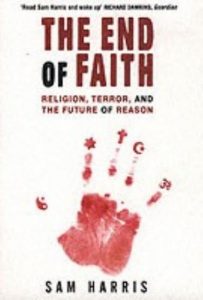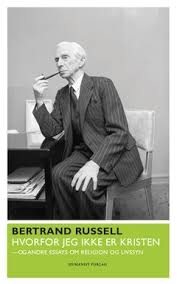
Emneliste om religionskritik og debat med udgangspunkt i bøger om religion af Richard Dawkins (The God Delusion / Illusionen om Gud), Daniel C. Dennett (Breaking the Spell), Sam Harris (The End of Faith / Troens Fallit), Christopher Hitchens (God is not Great / Gud er ikke stor) og Bertrand Russell (Hvorfor jeg ikke er kristen).
Indhold
- Forord
- Samleanmeldelser
- Richard Dawkins: The God Delusion / Illusionen om Gud
- Daniel C. Dennett: Breaking the Spell
- Sam Harris: The End of Faith / Troens Fallit
- Christopher Hitchens: God is not Great / Gud er ikke stor
- Bertrand Russell: Hvorfor jeg ikke er kristen
Forord
I forbindelse med religionens øgede politiske betydning, er der gennem de sidste par år udgivet en række bøger med hård og polemisk religionskritik fra filosoffer og evolutionsbiologer. Bøgerne har medført omfattende debat, og vi har her samlet lidt af diskussionen – både fra venstrefløjen og bredere.
Bjarne A. Frandsen, juni 2007.
Revideret marts 2019.
Se også på Socialistisk Bibliotek:
- Emneoversigten: Venstrefløjen og religion
- Emnelisten: Socialister om Religion, om socialistiske religionskritikere
Samleanmeldelser
Klassekampen
Christiane Jordheim Larsen: Nyateistisk vekkelse (11. januar 2007)
“Er du ‘bright’? Den nyateistiske bevegelsen ser til homobevegelsen for inspirasjon. De vil ha deg ut av skapet.”
Politiken
Jens Lenler: Ateisterne angriber (24. december 2007)
“Internationale bestsellere og prominente ateister kræver fornuften tilbage og angriber de troende. Også Danmark har fået to ateistiske talerør.”
Against the Current
Terry Eagleton: The God question (No.136, September/October 2008)
“Why has my local bookshop suddenly sprouted a section labeled ‘Atheism’? Why, just as we were apparently moving into a post-metaphysical, post-ideological, even post-historical era, is theology breaking out all over the place? Can we put it all down to fanatical Islamists and falling towers?”
AlterNet
Chris Hedges: The dangerous Atheism of Christopher Hitchens and Sam Harris (March 22, 2008)
“From demonizing Muslims to believing we can use science for our own moral advancement, the New Atheists preach a dangerous faith.”
Forskning.no
Erik Tunstad: Ateistene slår tilbake (1. november 2006)
“Hvorfor er vi religiøse? Representerer religiøs tro noen biologisk fordel for de troende, eller er troen mer å regne som et tilfeldig og kanskje til og med skadelig biprodukt av noe annet, og langt mer nyttig?”
In Defence of Marxism
Religion and secularism. By John Pickard (27 April 2011)
“As the twenty-first century progresses, there has been an increasing interest and not a small amount of debate on the role of religion in society and particularly on advances in secularisation.”
International Socialism
John Molyneux: More than opium: Marxism and religion (Issue 119, Summer 2008, p.51-73)
“Two vehemently anti-religious books have found their way into the bestsellers list – one by the ‘selfish gene’ biologist Richard Dawkins, the other by Christopher Hitchens, the one-time socialist who is now a fervent supporter of imperialist war. In a major article, John Molyneux shows how distant their attitude to religion is from that of the Marxist tradition.”
Jacobin
Luke Savage: New Atheism, old empire (February 12, 2014)
“The ‘New Atheists’ have gained traction because they give intellectual cover to Western imperialism.”
The Nation
Ronald Aronson: The new Atheists (June 25, 2007)
“The great success of the New Atheists is to have reached them, both speaking to and for them. These writers are devoted, with sledgehammer force and angry urgency, to ‘breaking the spell’ cast by the religious ascendancy … This does not make for restraint. Harris displays brash self-confidence, Hitchens and Dawkins angry intellectual bite and Dennett an inexhaustible theoretical energy and range of inquiry.”
The New York Review of Books
H. Allen Orr: A mission to convert (Vol.54, No.1, January 11, 2007)
“During the last year, a number of popular books on religion by scientists or philosophers of science have appeared. Daniel Dennett kicked things off with his Breaking the Spell (2006), an investigation into the possibility of a science of religion. Reviewing evolutionary, psychological, and economic theories of the origin and spread of belief, Dennett covered much ground but reached few conclusions. In the last few months, three prominent scientists – all biologists – have published their own books on belief. Richard Dawkins, has given us The God Delusion, an extended polemic against faith, which will be considered at length below.”
Socialist Review
The threat to reason. Book review by Neil Davidson (Issue 316, July/August 2007)
“The Enlightenment tradition is under attack – at least if a series of recent books are to be believed … Dan Hind convincingly shows … that under the cover of attacks on religion in general the greatest bile is invariably reserved for Islam.”
Wired
Gary Wolf: The church of the non-believers (Issue 14.11, Nov. 2006)
“A band of intellectual brothers is mounting a crusade against belief in God. Are they winning converts, or merely preaching to the choir?”
ZNet
A.J. Chien: The new Atheism (September 10, 2007)
“… a string of books critical of religion have become modest bestsellers in recent years … How could this happen in a country where upward of 80% majorities assert belief in God, Christ, and miracles?”
Wikipedia, the free encyclopedia
Category: Books critical of religion
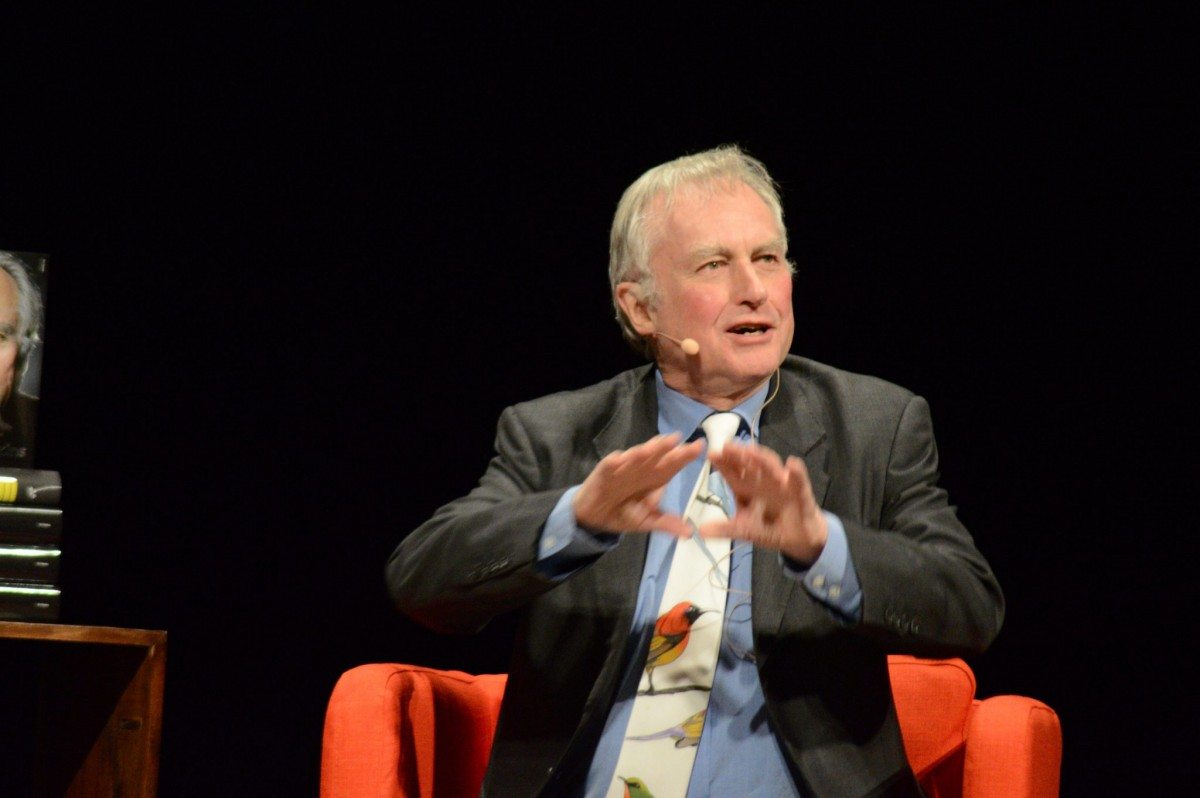
Richard Dawkins: The God Delusion / Illusionen om Gud
The God Delusion
By Richard Dawkins (London, Bantam, 2006, 372 s.). Dansk udgave: Illusionen om Gud (Thaning & Appel, 2007, 432 s.). See the English edition online (pdf) (Metataphysicspirit.com).
Wikipedia, the free encyclopedia
The God Delusion
Richard Dawkins
Richard Dawkins Foundation on Reason & Science
RichardDawkins.net
The Official Richard Dawkins Website.
Forskning.no
Erik Tunstad: Forfriskende religionskritikk (3. november 2006)
“Evolusjonsbiologen Richard Dawkins bruker tung redskap når han dundrer løs på religionen i sin siste bok The God Delusion. Forfriskende for ateister, men han omvender neppe de troende.”
Information
Johann Hari: Ateismens ayatollah (25. januar 2006)
“Dawkins er ikke perfekt. Selvfølgelig er religion ikke roden til alt ondt. Den tanke kan imødegås med to ord: Stalin og Mao. At udrydde religiøs overtro gør det ikke af med hver en farlig forblændelse. Men han er en af de få, som i dag har mod til at udfordre troens anmassende mørkemænd …”
Klassekampen
Christiane Jordheim Larsen: Vil rette på det vrange (22. desember, 2006)
“Et univers med en personlig gud skiller seg fra et uten, sier Richard Dawkins, som argumenterer for at det nesten helt sikkert ikke finnes noen gud.”
Kristeligt Dagblad
Erik Bjerager: Illusionen om altings forklaring (12. oktober 2007)
“Richard Dawkins’ ateisme og afvisning af Gud er lige så intolerant og doktrinær som det værste af den religion, han gør udfald imod.”
Bjarne Nørum: Gud er ikke stor (4. juni 2007)
” Videnskabsmanden og forfatteren Richard Dawkins er en superstjerne på den internationale boghimmel. Kristeligt Dagblad har mødt den kontroversielle ateist til litteraturfestival i Hay on Wye i Wales.”
Sidsel Nyholm: Tro er blændværk (26. januar 2007)
” Biologen Richard Dawkins’ polemiske bestseller om ‘Vrangforestillingen om Gud’ udfordrer religiøs tro ud fra både en psykologisk, historisk og naturvidenskabelig vinkel. Religion er blændværk, og at opdrage børn til at tro på Gud er lig med mishandling, argumenterer Dawkins, der med sin bog vil fyre op under verdens ateister.”
Politiken
Lars Sandbeck: Dawkins Mysteriet (5. november 2007)
“Biologen Richard Dawkins’ opgør med religionen er næsten ikke til at tage seriøst; til gengæld er det underholdende læsning.”
AlterNet
Alister McGrath: The Dawkins Delusion (January 26, 2007)
“An Oxford theologian contends that the aggressive rhetoric of Richard Dawkins’ books masks a deep insecurity about the public credibility of atheism.”
Atheist Richard Dawkins on ‘The God Delusion’. Interview with Terrence McNally (January 18, 2007)
“In the last few years, Americans have seen the harm that results when political decisions are made in the name of religion. Now, the non-believers are fighting back.”
eSkeptic
Beyond demonic memes: why Richard Dawkins is wrong about Religion (July 4, 2007)
“David Sloan Wilson shares with us his analysis of Dawkins’ theory of religion, which he feels is wide of the mark based on the evidence.” See Richard Dawkins replies (July 11, 2007)
Norman Levitt: What a friend we have in Dawkins + Michael Shermer: Arguing for Atheism (January 31, 2007)
Fifth International
An ultimately crude and one-sided atheism (Vol.2, No.5, Summer 2008; online at Internet Archive)
“His moral zeitgeist is capable of mocking the evident absurdities of the religious ideas of the great unwashed masses, and the cynicism with which religious and secular elites make use of these ideas. It is unable, however, to explain the source of the great contradiction with which he tries to grapple – that the achievements of capitalist modernity conflict with the ideas of religion in all sorts of ways, but at the same time reproduce religious belief like smallpox.”
The Telegraph
Kenan Malik: I don’t believe in Richard Dawkins (8 October 2006)
“Dawkins’s polemic against the need for religion is compelling, even if the arguments are not particularly new. Less persuasive is his attempt to explain what faith is and why people continue to believe. So great is his loathing for religion that it sometimes overwhelms his reasoned argument.”
London Review of Books
Terry Eagleton: Lunging, flailing, mispunching (Vol. 28, No. 20, 19 October 2006)
“Card-carrying rationalists like Dawkins, who is the nearest thing to a professional atheist we have had since Bertrand Russell, are in one sense the least well-equipped to understand what they castigate, since they don’t believe there is anything there to be understood, or at least anything worth understanding. This is why they invariably come up with vulgar caricatures of religious faith that would make a first-year theology student wince.”
The New York Review of Books
H. Allen Orr: A mission to convert (Vol. 54, No. 1, January 11, 2007)
“The most disappointing feature of The God Delusion is Dawkins’s failure to engage religious thought in any serious way. This is, obviously, an odd thing to say about a book-length investigation into God. But the problem reflects Dawkins’s cavalier attitude about the quality of religious thinking. Dawkins tends to dismiss simple expressions of belief as base superstition.”
Socialism Today
Niall Mulholland: Dissecting ‘the God hypothesis’ (Issue 110, June 2007)
“The God Delusion is a powerful counterblast to reactionary religious leaders and the fog of mystical ideas and Dawkins has the right to robustly put forward rational, scientific arguments … This does not mean socialists would agree with everything Dawkins writes or would always take the same approach. His arguments sometimes feel abstract. Crucial factors like society, class, history, ‘tradition and culture’, and politics, or the reasons for the religious outlook of many poor and oppressed people, are not properly addressed or not at all.”
Socialist Democracy
John McAnulty: Vulgar materialism meets the spirit world (14 October 2007)
“Dawkins trashes religion, but he does so from a crude and dogmatic positivism and reductionism that is thoroughly reactionary … The book is at its strongest when it enters battle against the creationists, disguised as advocates of the argument for intelligent design as the source of biological diversity.”
Socialist Worker
Michael Rosen: Richard Dawkins: damning the religious (Issue 1984, 21 January 2006)
“Michael Rosen argues that Richard Dawkins’ new TV series, The Root Of All Evil, misunderstands the historical role of religion and those who practise it.”
Spiked
Michael Fitzpatrick: The Dawkins delusion (18 December 2006)
“‘Catholic atheist’ Michael Fitzpatrick finds himself repelled by Richard Dawkins’ crass and prejudiced polemic against religion.”
Weekly Worker
Paul Greenaway: Domination theology (Issue 607, January 12, 2006)
“How is it, asks a puzzled and sometimes furious Dawkins, that in what ‘should be an age of reason’, instead there is an ‘elephant in the garden’ called religion – a superstitious thought system which in his damning view invites the ‘positive suspension of critical faculties’ and thus promotes intolerance, fanaticism and violence?”
Workers Liberty
Clive Bradley: Richard Dawkins, The God Delusion (5 April 2007)
“I think it is a mark of something about the contemporary world that much of the tone of Dawkins’ critique of religion would have been commonplace thirty, or even a hundred and fifty years ago, yet now the forthrightness with which he denounces the Biblical God seems slightly shocking. Secularists have given too much ground to the God Squad.”
Janine Booth: Is religion the root of all evil? (10 January, 2006)
+ Part 2 (17 January, 2006)
“On the broad question he addressed – science versus religious superstition – Dawkins is absolutely right, and he is right to raise the alarm about the revival of religious belief and the repression and violence it can lead to … But, there are some buts.”
World Socialist Web Site
Joe Kay: Science, religion and society: Richard Dawkins’s The God Delusion (15 March 2007)
“The problem Dawkins and others confront in explaining religious and ideological change lies ultimately in their refusal to take up Marxist theory. Dawkins refers to Marx only once in passing, and deals with class theory only in the paragraph quoted above. For Dawkins, religion has no social or political significance. He treats it merely as an idea without any real connections to the more material conditions of life.”

Daniel C. Dennett: Breaking the Spell
Breaking the spell: religion as a natural phenomenon
By Daniel C. Dennett (New York, Viking, 2006, 448 s.)
Wikipedia, the free encyclopedia
Information
Rune Lykkeberg: Kamp mod forbandelser ved højlys dag (12. maj 2007)
“Den amerikanske filosof og religionskritiker Daniel Dennett kom til Amager og forklarede, at religioner egentlig er udviklet ligesom en moderne ko.”
Klassekampen
Christiane Jordheim Larsen: Vil dissekere religion (21. desember, 2006)
“Daniel C. Dennett står i fremste rekke blant dem som vil forklare religion som naturfenomen. Det kan hjelpe oss med å hindre religiøst begrunnet terrorisme.”
KenMalik.com
Review by Kenan Malik (8 April 2006)
“His project of putting religion under rational scrutiny is surely to be welcomed in an age in which faith seems to shape so much of people’s responses to political and social issues. The real problem is that Dennett’s explanation of religion is less than convincing. It may be true that humans possess certain psychological dispositions that open them to religious ideas. But uncovering such traits is not the same as explaining the origins, let alone the contemporary attractions, of religion.”
The New Yorker
H. Allen Orr: The good project (April 2006)
“‘Breaking the Spell’ ranges widely, perhaps too widely. It surveys the state of religion in contemporary America, considers whether believers are happier or more moral than nonbelievers, discusses the rise of modern nondenominational spirituality, and briefly reviews the purported philosophical proofs for the existence of God. But all these topics have been widely discussed, and Dennett has little new to say about them; his real contribution is an accessible account of what might be called the natural history of religion.”
World Socialist Web Site
James Brookfield: Dennett’s dangerous idea (6 November 2006)
“The strengths of Dennett’s book lie in its materialism and the fact that it makes reference to a wide body of contemporary research on these subjects … [it] does have, however, significant limitations. While the centrality of neo-Darwinism to his outlook contributes to an historical approach to the development of religion, Dennett does not add to this a theoretical framework for considering the development of human society. Dennett treats human history in a very abstract, non-concrete form.”
James Brookfield: Religion and science: a reply to a right-wing attack on philosopher Daniel Dennett (21 March 2006)
“The 19 February 2006 issue of the New York Times Book Review carries a tendentious attack on Breaking the Spell: Religion as a Natural Phenomenon, the latest work by American philosopher Daniel Dennett.”
Daniel Dennett: Breaking the Spell – Religion as a Natural Phenomenon (YouTube.com; 58:43 min.)
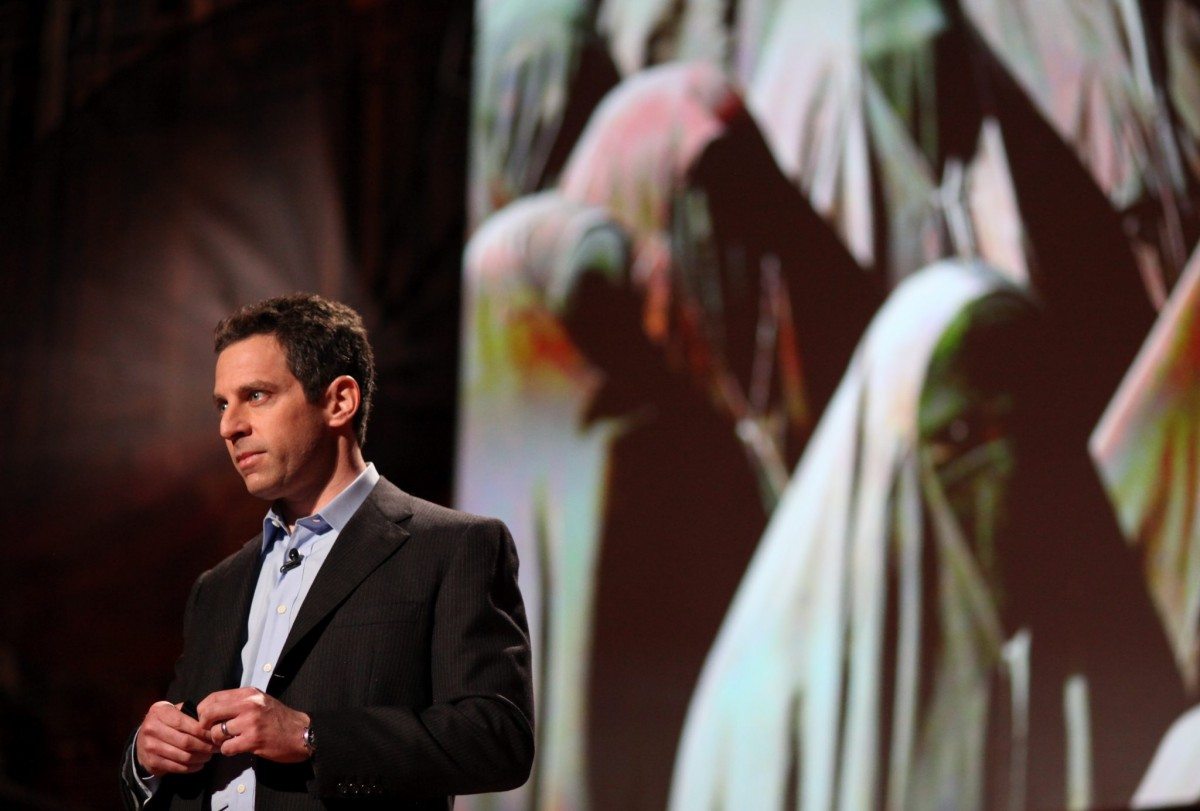
Sam Harris: The End of Faith / Troens Fallit
The End of Faith: Religion, Terror, and the Future of Reason
By Sam Harris (New York, W.W. Norton, 2005, 348 s.). Dansk udgave: Troens fallit: religion, terror og fornuftens fremtid (Akademisk Forlag, 2007, 332 s.)
Letter to a Christian nation
By Sam Harris (New York, Knopf, 2006, 96 s.). Dansk udgave: Brev til en kristen nation (Akademisk Forlag, 2007, 101 s.)
Wikipedia, the free encyclopedia
Humanisme.dk
Rune Engelbreth Larsen: Troens eller troskritikkens fallit? Sam Harris’ aggressive ateisme (25.7.2007)
“Sam Harris hører sammen med Richard Dawkins til de senere års skarpeste religionskritikere, der på den ene side påpeger og udstiller flere trosretningers ildevarslende tendenser og paradoksale forklaringsproblemer, men hvis ateistiske udgangspunkt imidlertid på den anden side lider under en række ensidige fordomme og proportionsforvrængende kortslutninger …”
Information
Sam Harris: Troens spektrum (11. april 2007)
“De moderate religiøse værner uvægerlig deres mere fanatiske trosfæller imod en effektiv konfrontation med den kritiske fornuft, skriver Sam Harris – en førende fortaler for tidens nye ‘militante ateisme’.”
Sam Harris: 10 myter og sandheder om ateisme (8. januar 2007)
“I det superreligiøse USA er ateisme moralsk og politisk diskvalificerende for det store flertal. Det nødvendiggør et opgør med de udbredte misforståelser om, hvad ateisme indebærer.”
Kritisk Fornuft
Per Clausen: Til kamp mod den religiøse overtro (10. maj 2006)
“… han stiller de fundamentale og nødvendige spørgsmål, nemlig hvorfor vi skal tage hensyn til religiøse dogmer, der er totalt uunderbyggede, og følgelig med hvilken ret det religiøse indtager en særstilling i den offentlige diskurs.”
Politiken
Lars Sandbeck: Opgør med fundamentalismen (2. juni 2007)
“Sam Harris’ nyeste bog henvender sig direkte til de kristne fundamentalister, der især i USA har penge og politisk magt i ryggen.”
Lars Sandbeck: Til kamp mod religionen (21. april 2007)
“Sam Harris forener synspunkter fra den politiske højrefløj med en aggressiv ateisme. Resultatet bliver et politisk opgør med trosfriheden.”
AlterNet
John Gorenfeld: Sam Harris’s faith in Eastern spirituality and Muslim torture (January 5, 2007)
“The best-selling author of ‘The End of Faith’ may argue against Christianity, but he is also supportive of phenomena such as reincarnation and ESP, and calls for ‘compassionately killing’ the ‘Muslim hordes’.”
MR Online
Alexander Saxton: Faith in the ‘War with Islam’ (October 19, 2006)
“After having declared all religions irrational, divisive, and inciters of conflicts that threaten the destruction of civilization, Harris turns to a vitriolic and selective polemic against Islam. This permeates the entire book.”
Truthdig
An Atheist Manifesto (December 7, 2005)
“Sam Harris argues against irrational faith and its adherents.”
What Next!
Doug Lowe: A kick up the ’arris (No.31, 2007)
“A book that began as an acute dissection of the contradictions and irrationality of all main religions ended up as a cleverly re-packaged flag-waving exercise. I can’t quite decide whether Harris is confused, naïve, cynical, a bad historian or a combination of all four.”
World Socialist Web Site
Christie Schaefer: Atheism in the service of political reaction : A comment on author Sam Harris (16 April 2007)
“Harris has been hailed by some as something of a rationalist savior. While on the surface his arguments against the current violent trends in fundamentalist religions seem something with which most people would agree, it does not take much examination to reveal an extremely backward and reactionary perspective underneath.”
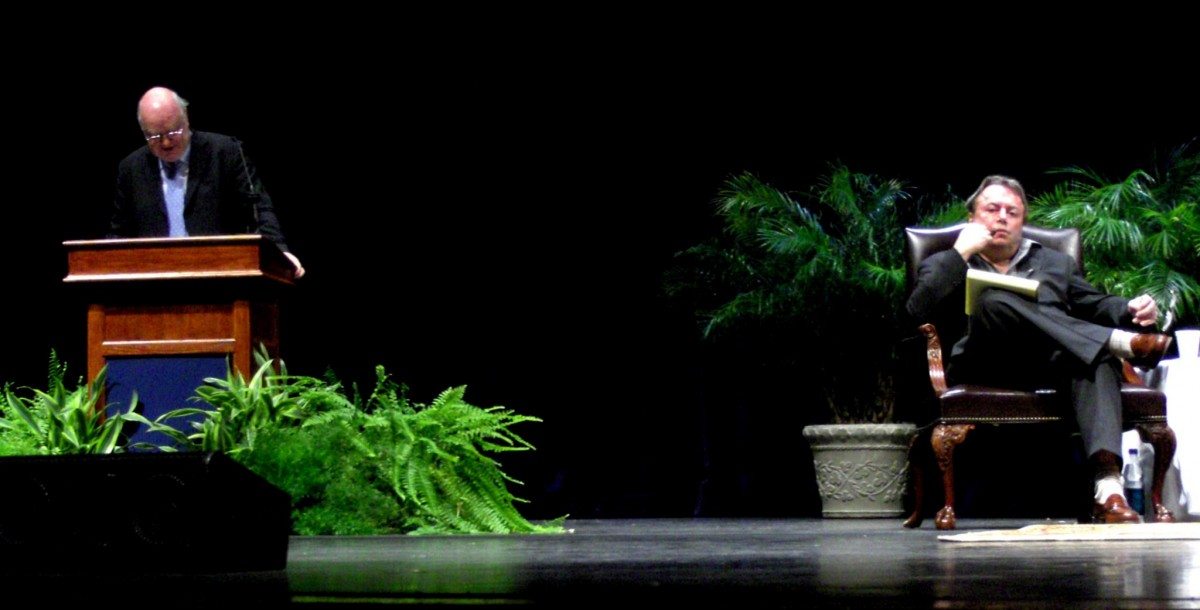
Christopher Hitchens: God is not Great / Gud er ikke stor
God is not great: how religion poisons everything
By Christopher Hitchens (New York, Warner Books, 2007). Dansk udgave: Gud er ikke stor : hvordan religionen forpester alt (Gyldendal, 2007, 362 s.)
Wikipedia, the free encyclopedia
Information
Martin Burcharth: Sådan gør man op med religion i Guds eget land (19. maj 2007)
“Den flabede eksilbrite Christopher Hitchens har gjort kunststykket igen. I sin nye bog kalder han religion roden til al ondt. Af en eller anden grund slipper han billigt fra provokationen i sit adopterede Amerika.”
Politiken
Marcus Rubin: Fri os fra det guddommelige (24. november 2007)
“Religioner er roden til alt ondt, og verden kan ikke blive fri for dem hurtigt nok. Det er budskabet i Christopher Hitchens’ brillant skrevne intellektuelle tour de force, men næppe en bog, som overbeviser ret mange troende om ateismens glæder.
Lenin’s Tomb
Richard Seymour: Reason in revolt: two books on enlightenment (July 4, 2007)
“God Is Not Great is sometimes witty, or at least half-witty, which is better than average. And it displays some of the author’s ostentatiously wide learning with some of the old lapidary skill … It is also superficial, error-strewn, and riddled with inconsistency and disavowal.”
The Nation
Daniel Lazare: Among the Disbelievers (May 28, 2007)
“Christopher Hitchens’s new book, God Is Not Great, is another example of atheism as an empty vessel, one he manages to fill with an intellectual justification for George W. Bush’s ‘war on terror’ … Yet one person is conspicuously absent from Hitchens’s list of religious evil-doers: George W. Bush. Yes, the man who said Jesus is his favorite philosopher.”
Socialist Review
Shaun Doherty: Book review (Issue 316, July/August 2007)
“Hitchens sees religion as the root of all evil and this leads to a crudely reductive and ahistorical approach.”
The Spiked Review of Books
Michael Fitzpatrick: Baiting the devout (Issue 2, June 2007)
“It is because secular intellectuals have lost their own belief in progress and liberation that they are turning venomously on those who retain a vision of the good society: the religious.”
God Is Not Great: How Religion Poisons Everything – Chapter Nine: The Koran Is Borrowed From Both Jewish and Christian Myths (YouTube.com, 28:43 min.)
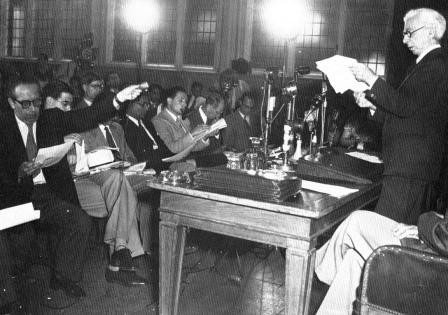
Bertrand Russell: Hvorfor jeg ikke er kristen
Hvorfor jeg ikke er kristen
Af Bertrand Russell (Bindslev, 2007, 121 s.)
Bogen er tidligere udkommet på dansk i en større udgave med titlen Derfor er jeg ikke kristen (Biilmann & Eriksen, 1966, 239 s.). Den nye udgave er nyoversat og med indledning af Flemming Chr. Nielsen, og består af de 4 mest centrale kapitler af de oprindelige 14.
Wikipedia, the free encyclopedia
- Why I Am Not a Christian. Med link til hovedartiklen online.
- Bertrand Russell
Information
Rune Lykkeberg: Kampskrift mod kristendommen (20. marts 2007)
“Intelligens har skabt problemer i Vesten, men er det grund til at kaste os ud i mørket og omfavne overtroen? Nej, sagde Bertrand Russell.”
Kristeligt Dagblad
Sørine Gotfredsen: Der er grænser for logikken (22. marts 2007)
” Bertrand Russell har interessante pointer i sin religionskritik, men han kommer også til kort. Guds eksistens kan ikke diskuteres i et rum af ren logik.”
Litteraturnu.dk
Anders Gudmundsson: Blasfemikerens miniguide til kristendommen (5. august 2007)
“Hvorfor jeg ikke er kristen er til trods for dens åbenlyse svagheder en fin lille og letlæst introduktion til blasfemien.”
















